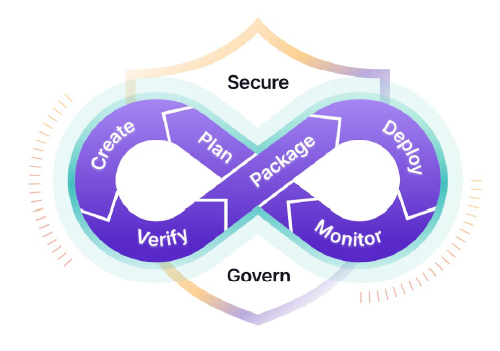Mastering DevOps: A Comprehensive Guide
DevOps, a portmanteau of “development” and “operations,” is not just a set of practices or tools; it’s a cultural shift that aims to bridge the gap between development and IT operations teams. By breaking down silos and fostering collaboration, DevOps seeks to streamline the software development lifecycle, from planning and coding to testing, deployment, and maintenance.
The Importance of DevOps in Software Development:
The importance of DevOps in modern software development cannot be overstated. Here’s why:
- Speed and Efficiency: DevOps enables organizations to deliver software faster and more efficiently by automating repetitive tasks, reducing manual errors, and improving team collaboration.
- Reliability and Stability: By embracing practices like Continuous Integration (CI) and Continuous Deployment (CD), DevOps helps ensure that software releases are reliable, stable, and predictable, improving customer satisfaction.
- Innovation and Agility: DevOps encourages a culture of experimentation and innovation by allowing teams to iterate quickly, adapt to changing market demands, and deliver value to customers faster.
- Cost Reduction: By optimizing processes and eliminating waste, DevOps helps reduce costs associated with software development, deployment, and maintenance.
- Competitive Advantage: Organizations that successfully implement DevOps practices can gain a competitive advantage in their respective industries by accelerating time-to-market, improving product quality, and fostering a culture of continuous improvement.
What is DevOps?
As more organizations embrace DevOps, many team members are new to the concept. According to GitLab’s 2023 survey, 56% now use DevOps, up from 47% in 2022. If your team is new to DevOps or getting ready to adopt it, this comprehensive guide will help. We’ll cover what is DevOps (and isn’t), essential tools and terms, and why teamwork is vital for success.
In the past, software development processes were often fragmented, causing bottlenecks and delays, with security an afterthought. DevOps emerged from frustrations with this outdated approach, promising simplicity and speed.
A unified DevOps platform is key to optimizing workflows. It consolidates various tools into a cohesive ecosystem, eliminating the need to switch between multiple tools and saving valuable time and resources. This integrated environment facilitates the entire software development lifecycle, enabling teams to conceive, build, and deliver software efficiently, continuously, and securely. This benefits businesses by enabling rapid response to customer needs, maintaining compliance, staying ahead of competitors, and adapting to changing business environments.
Understanding DevOps is to understand its underlying culture. DevOps culture emphasizes collaboration, shared responsibility, and a relentless focus on rapid iteration, assessment, and improvement. Agility is paramount, enabling teams to quickly learn and deploy new features, driving continuous enhancement and feature deployment.
 Evolution of DevOps
Evolution of DevOps
Historically, development and operations teams worked in isolation, leading to communication gaps, inefficiencies, and slow delivery cycles. The need for a more collaborative and agile approach became apparent with the rise of agile methodologies in software development. DevOps evolved as a natural extension of agile principles, emphasizing continuous integration, automation, and rapid feedback loops. Over time, DevOps has matured into a holistic approach to software delivery, with organizations across industries embracing its principles to stay competitive in the digital age.
Key Principles of DevOps
DevOps is guided by several key principles, including:
- Automation: Automating repetitive tasks and processes to accelerate delivery and reduce errors.
- Continuous Integration (CI): Integrating code changes into a shared repository frequently, enabling early detection of issues.
- Continuous Delivery (CD): Ensuring that code changes can be deployed to production quickly and safely at any time.
- Infrastructure as Code (IaC): Managing infrastructure through code to enable reproducibility, scalability, and consistency.
- Monitoring and Feedback: Collecting and analyzing data from production environments to drive continuous improvement.
- Collaboration and Communication: Fostering a culture of collaboration, transparency, and shared goals across teams.
- Shared Responsibility: Encouraging cross-functional teams to take ownership of the entire software delivery process, from development to operations.
The Three Main Benefits of DevOps
1. Collaboration
In traditional software development environments, silos between development and operations teams often result in communication barriers and delays. However, adopting a DevOps model breaks down these barriers, fostering a culture of collaboration and shared responsibility. With DevOps, teams work together seamlessly, aligning their efforts towards common goals and objectives. By promoting open communication and collaboration, DevOps enables faster problem-solving, smoother workflows, and ultimately, more successful outcomes.
2. Fluid Responsiveness
One of the key benefits of DevOps is its ability to facilitate real-time feedback and adaptability. With continuous integration and delivery pipelines in place, teams receive immediate feedback on code changes, allowing them to make adjustments and improvements quickly. This fluid responsiveness ensures that issues can be addressed promptly, preventing them from escalating into larger problems. Additionally, by eliminating guesswork and promoting transparency, DevOps enables teams to make informed decisions based on data-driven insights, further enhancing their ability to respond effectively to changing requirements and market dynamics.
3. Shorter Cycle Time
DevOps practices streamline the software development lifecycle, resulting in shorter cycle times and faster delivery of features and updates. By automating manual processes, minimizing handoff friction, and optimizing workflows, DevOps enables teams to release new code more rapidly while maintaining high standards of quality and security. This accelerated pace of delivery not only allows organizations to stay ahead of competitors but also increases their ability to meet customer demands and market expectations in a timely manner.
Conclusion
Adopting a DevOps strategy offers numerous benefits to organizations, including improved collaboration, fluid responsiveness, and shorter cycle times. By breaking down silos, promoting collaboration, and embracing automation, organizations can unlock new levels of efficiency, agility, and innovation, ultimately gaining a competitive edge in today’s fast-paced digital landscape.






